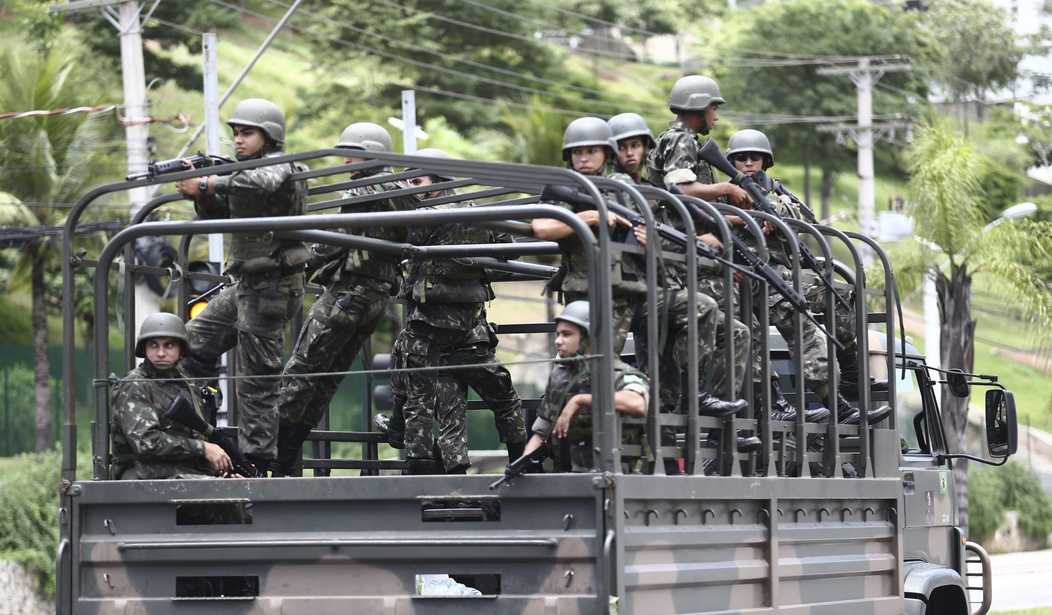Six days ago police officers walked off their jobs in Espírito Santo, Brazil, and now gangs wielding guns and machetes are running wild in the streets, leaving some terrified residents afraid to leave their homes.
The violent mayhem that has followed the strike in the coastal state has led to at least 100 deaths, according to reports, and is being compared to the 2014 movie “The Purge.” Videos have emerged showing rogue gunmen shooting people at random and setting buses on fire.
Espirito Santo has turned over security duties to the army, the Guardian reports:
The decree authorizing the transfer was published Wednesday in the state’s official gazette, as schools and businesses closed and public transportation was at a standstill.
Chaos and anarchy spurred by the strike, now in its sixth day, continued in the coastal state to the north of Rio de Janeiro, despite the deployment of 1,200 army soldiers and federal police and the promise that more help was on its way.
Most of the violence was centered in the state capital, Vitória, a wealthy port city ringed by golden beaches, where mining and petroleum industries have a strong base.
State officials said they needed hundreds more federal troops and members of an elite federal police force to help establish order and make up for the 1,800 state police who normally patrol Vitória’s metropolitan area.
The state government has not released an official number for killings since police went on strike on Saturday for better pay, but a spokeswoman for the union representing police told Reuters early on Thursday it had registered 101 homicides since Saturday.
According to the Guardian, that is six times the state’s average daily homicide rate. Car thefts and robberies have also skyrocketed since officers walked out on their jobs. The police are reportedly demanding that salaries be doubled for every category of officer. Their union says they haven’t received a raise for four years.
The strike comes as Brazil is wracked by its worst recession on record and struggling to ensure even basic health, education, and security services.
What brought them to this place?
In September of 2009, Brazil’s socialist superstar “Lula” was hailed by none other than then-President Barack Obama as “the most popular politician on earth.” When Luiz Inácio Lula da Silva visited New York that month for the 64th session of the United Nations General Assembly, the enamored editors of Newsweek were swept off their feet:
The cameras may focus on the embodiment of American cool, Barack Obama, or on flamboyant autocrats and chest thumpers like Iran’s Mahmoud Ahmadinejad and Venezuela’s Hugo Chávez, but the biggest star on hand will be the blunt, bearded onetime lathe operator: Brazil’s president, Luiz Inácio Lula da Silva. After nearly seven tumultuous years in office, the man everyone calls Lula continues to enjoy an approval rating above 70 percent. That would be a remarkable feat anywhere, never mind in a continent where presidents are a disposable commodity. “That’s my man right there,” Obama greeted him at the G20 summit in London in April. “The most popular politician on earth.”
Earlier that year, Obama had reportedly “tapped” Lula to be the next World Bank president:
Lula, an immensely popular leader at home and abroad, has indicated he would be “honoured” to take the job at the bank after he steps down as Brazil’s president in 2011, according to the Brazilian magazine Exame.
Marcelo Onaga, a columnist for the respected business weekly, reported that the US state department had sounded out senior officials in Brasilia over the proposal and received a positive response.
The Wall Street Journal’s Mary O’Grady explained last August how well Lula’s socialist policies worked out in the end:
Under Lula and later Ms. Rousseff—who won elections in 2010 and 2014—the commitment to fiscal discipline gradually eroded. The government-owned bank Caixa Econômica Federal and the national development bank (BNDES) rapidly expanded credit. This was inflationary and risky, but the central bank ignored the problem.
While Lula and later Dilma were hawking Brazil as a world-class player, they did little to reduce the burden of government on entrepreneurs. The 2016 World Bank “Doing Business” survey, which studies the relative ease of entrepreneurship in 189 economies, ranks Brazil 174th in “starting a business,” 169th in “dealing with construction permits,” 130th in “registering property,” 178th in “paying taxes” and 145th in “trading across borders.” That doesn’t sound like the stuff of an economic superpower.
In late July, Lula was charged by a Brazilian federal court with obstruction of justice in a corruption investigation. Ms. Rousseff has been impeached for cooking government books and is now being tried by the senate.
If political fraud for leading a nation to ruin were a crime, they both already would have been convicted.
Corruption charges have piled up against Lula since then, including accusations of a bribery scheme involving Marcelo Odebrecht, the ex-CEO of engineering group Odebrecht SA.
Lula already faced several other charges related to a sweeping kickback probe at state-run oil company Petrobras, and Odebrecht is serving a 19-year sentence after his conviction on other corruption allegations in the investigation.
The new charges come amid expectations that Odebrecht – Latin America’s largest construction conglomerate – is on the cusp of signing a leniency deal with prosecutors that would see its former CEO and dozens of other executives turn state’s witness.
Prosecutors have said the Odebrecht group, with its global reach and powerful connections inside Brazil, was at the heart of the long-running corruption scheme. Testimony from its executives could significantly expand the Petrobras probe, lead to new investigations and implicate more politicians.
As O’Grady explained, in Lula’s Brazil “bureaucracy runs things from the top down and human beings are an afterthought.”
This socialist government of corruption, graft, and fraud has directly led to what we’re seeing there today: blood in the streets and people afraid to venture out of their homes.









Join the conversation as a VIP Member